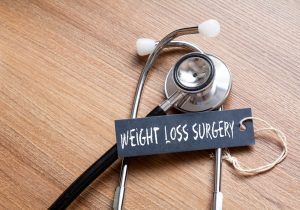Prescription weight loss involves using prescription drugs as a treatment to reduce weight. The medications specifically aim to reduce hunger and increase feelings of fullness.(Learn More)
It should be noted that prescription weight loss is not for everyone. Most people experience success with lifestyle changes, while others might need more extensive treatments, such as surgery. (Learn More)
As of 2019, the FDA has approved five drugs for long-term use for weight loss: bupropion-naltrexone, liraglutide, lorcaserin, orlistat, and phentermine-topiramate. (Learn More)
Whatever you’re prescribed, make sure you understand their benefits and risks. Talk openly with your doctor about any health problems or drugs you are taking. Failing to disclose certain pieces of information could be dangerous.
In some cases, your doctor may prescribe drug treatments that are not approved by the FDA. This is rare, but sometimes appropriate. Some people have a unique combination of conditions that may make such off-label treatments necessary. Discuss your concerns with your doctor since off-label treatments come with unique risks. (Learn More)
Once your weight is at a better place, maintaining your weight loss is important. Talk to your doctor about lifestyle changes that help, especially if you are going off your medication. (Learn More)
The exact drug and treatment plan that is best for you will vary. What works for one person won’t necessarily work for another. (Learn More)
Prescription Weight Loss
Prescription weight loss is the use of prescription drugs to lose weight. It is generally only a good option for those with a BMI of 27 to 30. While the BMI system is not a perfect indicator of health, it is a good enough system to allow trained doctors to figure out the best course forward for you.
If your BMI is over 30, it is likely prescription weight loss drugs will be considered for you. If your BMI is 27 or more, you will probably first need to show other signs of weight-related issues for your doctor to be comfortable considering such things, such as high blood pressure or type 2 diabetes.
These drugs are not for everyone. Most people benefit from lifestyle changes without any additional treatments. Others may require a fairly comprehensive program to improve their weight, including lifestyle changes, medications, and possibly even surgeries. Broadly speaking, the more overweight someone is (and the more difficult it is for them to lose weight), the more extensive their treatment will have to be.
There is no shame in needing to lose weight, nor in your doctor deciding lifestyle changes alone won’t sufficiently help you. From a medical perspective, the goal of weight loss is to reduce your risk of health complications.
There is no “cheating” in that regard. It is all about what will be most effective and safest for you as determined by a trained professional.
Never take weight loss medications without discussing it first with your doctor. They come with the potential for various side effects, so it’s important to be medically supervised throughout the entire process.
One of Many Options

When discussing weight loss with your doctor, you’ll cover lifestyle changes and whether there are any other treatments, such as surgeries, that might benefit you.
In 2022, diet and exercise are still the best approach for weight loss. Even if you are prescribed weight loss medications, these must be used in conjunction with a diet and exercise program.
FDA-Approved Drugs
There are five weight-loss drugs approved by the American FDA for long-term use.
- Bupropion-naltrexone: This is a combination of the drugs buprenorphine and naltrexone. The medication can help you feel fuller sooner.
The medication is not without risk. It can be very dangerous for some people. Do not use it if you struggle with opioid or alcohol abuse, have high blood pressure, or have a history of anorexia. It can cause a number of stomach, liver, and heart problems, and it may increase the chances of suicidal thoughts. - Liraglutide: Only available by injection, this drug can make you feel less hungry and fuller sooner. It is sometimes used to help people with type 2 diabetes.
It does come with potential side effects. It can cause stomach and digestion problems, headaches, and a raised pulse. It may increase your risk of pancreatitis and potentially of a rare thyroid tumor, but this last point was only proven in animal tests. - Lorcaserin: By acting on serotonin receptors in the brain, this medication can help you feel fuller with smaller amounts of food.
Again, side effects are possible. It can cause dizziness, dry mouth, drowsiness, coughing, nausea, and constipation. Alert your doctor to any medications you are on before taking this drug, as it can react poorly with some migraine and antidepressant drugs. - Orlistat: One of few drugs also approved for children (over the age of 12), orlistat works in the gut. It helps to reduce how much fat your body absorbs from the foods you eat.
It can cause stomach problems, including gas, diarrhea, nausea, stomach pain, and oily stool. It is shown to reduce your body’s ability to take in vitamins, and in rare cases, it can cause severe liver damage. Do not take it with cyclosporine. - Phentermine-topiramate: This drug is a combination of phentermine, which lessens appetite, and topiramate. The combination is shown to reduce hunger and make you feel fuller sooner.
It can cause dizziness, constipation, trouble sleeping, a tingling feeling in the hands and feet, constipation, and a change in how you taste things. If you have heart, kidney, or mood problems, be sure your doctor is aware of them before taking this drug.
You also should not take phentermine-topiramate if you have hyperthyroidism, glaucoma, are pregnant, or intend to become pregnant. Do not breastfeed while on this drug.
Since all of these drugs have their own set of side effects, keep your doctor fully informed on any medical conditions you have, any drugs you are taking (including illegal drugs and over-the-counter drugs), and any other information that may be relevant. You also should fully familiarize yourself with the risks of taking these drugs.
After 12 weeks on a full dose of a given medication, you will probably have your treatment plan adjusted by your doctor if you have not lost at least 5 percent of your body weight. While the cause is not necessarily the drug itself, this is a sign some element of your treatment plan is probably not working.
Phentermine is sometimes prescribed for short-term use for weight loss. It should not be used for longer than 12 weeks, as it has relatively serious side effects. Phentermine is fairly commonly prescribed. It is not associated with abuse, unlike many other weight loss drugs that are prescribed for short-term use.
Off-Label Treatments

Some drugs are used for purposes other than their FDA-approved uses. This is called “off-label” use. Included in off-label use is:
- The use of multiple drugs at the same time, which are not ordinarily used together.
- The use of a drug normally used to treat a different medical problem.
- Using a drug for a longer duration than is FDA approved.
Generally, off-label use is only prescribed when FDA-approved treatments are proving to be ineffective or when there is otherwise no other choice, such as for those with certain medical conditions that are interfering with ordinary treatments. Off-label use is not a first choice, but it can be an effective option when standard approaches don’t work.
Maintaining Results
Ideally, you will eventually stop taking weight loss medication, and your doses will be reduced over time. This may not be an option for everyone, such as those with thyroid problems, but it is usually the goal for most people who are prescribed weight loss medications.
Once you have achieved a healthy weight, talk to your doctor about your options. Many people gain some or even a great deal of weight back after stopping treatment. While minor weight gain is not necessarily serious, you should ensure your lifestyle will allow you to maintain your weight loss and avoid obesity and its associated risks.
Weight gain is primarily about improper diet and a lack of exercise, barring other medical issues. Learning to eat healthy (which is not exactly the same as simply eating less) will help to avoid major weight gain.
You should have a good basis for healthy eating before you stop taking the medication. Doctors advise medication should be taken in conjunction with an overall weight loss program that includes a structured diet and exercise regime. Oftentimes, meetings with a nutritionist are recommended to help you create a healthy eating plan that you can maintain long term.
Which Drug Is Right for Me?
There is no perfect solution for everyone seeking to lose weight. Your own personal needs will guide whether your doctor prescribes you medication and which medication they choose.
Some medications that work for one person will not work for another. Some may cause intolerable or even dangerous side effects that cause you to be unable to take them. It’s important to keep an open dialogue with your doctor, particularly during the first few weeks on the medication, to determine if it is a good choice for you.
You want to be taking the least potent medication possible, with the fewest side effects, that still helps you achieve the results you and your doctor determine are desirable. There are upsides and downsides to every medication. Your doctor will help you find the right balance for you.
References
Prescription Medications to Treat Overweight and Obesity. (July 2016). National Institute of Diabetes and Digestive and Kidney Diseases (NIDDK).
Prescription Weight-loss Drugs. (September 18, 2018). Mayo Foundation for Medical Education and Research (MFMER).
Body Mass Index (BMI). (May 15, 2015). Centers for Disease Control and Prevention.
What Causes Rapid Weight Gain? (April 3, 2019). Medical News Today.















